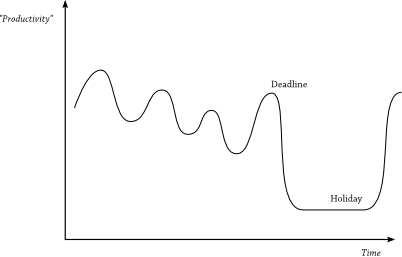June 22nd, 2009 by jose
New to AcademicProductivity.com?
Here are a few posts that other readers recommend you check out:
[dismiss]
Frankly, there are too many reference managers today. This is counterproductive because we all need to spend time checking the newcomers, just in case there’s a new feature that we were missing.
This is counterproductive because we all need to spend time checking the newcomers, just in case there’s a new feature that we were missing.
Most reference managers graft themselves to word or to openOffice. For example, Mendeley, and zotero both use internal reference functionality in word. In doing so, they use features that are available only on those editors. I think this is a big error for at least 3 reasons:
- I draft my papers on a text editor or oneNote. This has a lot of advantages for me. But I would not be able to use say Mendeley or Zotero on oneNote; and I do want to keep references on my notetaking tool. Using a text editor has a lot of nice advantages over a word processor too, if you know how to use it.
- It’s a lot faster to massage your reference the way you like it. It takes several clicks on zotero to get an Author (year, p. XX) reference. In endNote, it’d be a few keystrokes.
- There are bottlenecks in our digital lives that are plain text. For example, emails, forum posts, and google docs are cases of writing that may need reference management but are ill-served by most current offerings. I want to copy-paste chunks of scientific writing and still carry my references; there’s life outside word processors, and quite a lot of it!
So what reference managers work ok on plain text. Well, here is the surprise: as far as I know, only bibTeX and endnote. This is surprising because they are the oldest. One would have thought that newcomers would have taken advantage of what these older tools learned.
Lurking in the Zotero forums, I saw people asking for support of this exact feature. But it seems that it’s never going to happen. It would take a lot of reengineering, and all users that are happy with the current solution (and have amassed a large body of authored docs) would complain.
so, where does this leave me? I need to either comply and write everything in word to take advantage of Mendeley and Zotero, or stick to oneNote, but use endNote references. Of course I could also do everything on a text editor and use bibTeX, but right now, it’s more trouble than it’s worth.
Does anyone know a good solution for my setting?
Posted in Reference management, Resources, Software, Writing | 23 Comments » | 9164 views
June 15th, 2009 by james
I want to try something a bit different in this post. Here at AP.com, we’ve talked a lot about tools, theory, trends and the general ephemera of academic productivity. But writing as academics, we should probably be trying to take this experience and build it into a cohesive model of productivity. So my goal here is to suggest a general model, one that we might use to understand what we’ve learned from previous posts and hopefully apply to our own work.
My starting point for this post was simple; I wanted to know how my productivity has changed (hopefully improved) since I first started my DPhil. From keeping a research journal, I know that some days are more productive than others and it would very helpful if I could understand when those fits and starts occur, to spot co-occuring events and thereby learn when to say “Forget work, I’m going for a run.”
In other words, I wanted to plot my productivity cycle over time. It might look something like this:

But the obvious problem with this exercise is how to measure productivity. It’s a subject that’s been tackled indirectly on this site before but going through the old posts, I haven’t yet find any attempts at a general theory – and related measures – of productivity. So drawing on the collected wisdom of previous AP.com posts, here’s a rough sketch of such a theory.
Read the rest of this entry »
Posted in Evaluation, Statistics, Time management | 10 Comments » | 7786 views
June 13th, 2009 by jose
This post describes a very efficient way to digitize large amounts of books. Why is this important? If you are an academic you (1) have amassed a large collection of books and (2) are bounded to relocate more than a few times i n your life. Moving books is no fun. Plus being able to grep through your books, and read them even if you are away from home (conference, coffee shop, retreat) is really priceless.
n your life. Moving books is no fun. Plus being able to grep through your books, and read them even if you are away from home (conference, coffee shop, retreat) is really priceless.
Posted in Hacks, Reading, Search | No Comments » | 9919 views
June 12th, 2009 by jose
This could be a blessing. There are occasions where you (or your organization) have a lot of content in word files that would be better off in some form of collaborative/searchable repository. Wikis are very handy in these cases. However, it takes quite a lot of footwork to reformat all tables, headings etc to wiki parlance. This plugin for openOffice takes care of it.
There are occasions where you (or your organization) have a lot of content in word files that would be better off in some form of collaborative/searchable repository. Wikis are very handy in these cases. However, it takes quite a lot of footwork to reformat all tables, headings etc to wiki parlance. This plugin for openOffice takes care of it.
Some people have chosen a wiki for their scientific homepage (Dario posted a tutorial in How to run an invisible wiki). I have considered it myself, although I’m more inclined to use a wordpress blog (post on how to set it up to maximize google scholar’s chance of getting your pubs coming soon!). One of the advantages of a blog over a wiki is that one can use a very good WYSIWYYG tool, windows live writer. Unfortunately only for windows. Now, this advantage is gone: one could reasonably set up and update without having to ftp files around or use crappy editors that come built-in with most wikis.
Posted in FOSS, Social Media, Software, Web 2.0, Writing | 2 Comments » | 6548 views
June 7th, 2009 by jose
Good news for FOSS and the entire industry, really. Thomson Reuters claim didn’t hold on court. In an ecosystem where all competitors are launching new creative features every day (Mendeley, Zotero, citeSmart, jabRef, etc), development of endNote seems glacial.
EndNote maker’s lawsuit over open-source Zotero dismissed – Ars Technica
Posted in FOSS, News, Social Media, Software | 6 Comments » | 3360 views
 This is counterproductive because we all need to spend time checking the newcomers, just in case there’s a new feature that we were missing.
This is counterproductive because we all need to spend time checking the newcomers, just in case there’s a new feature that we were missing.


